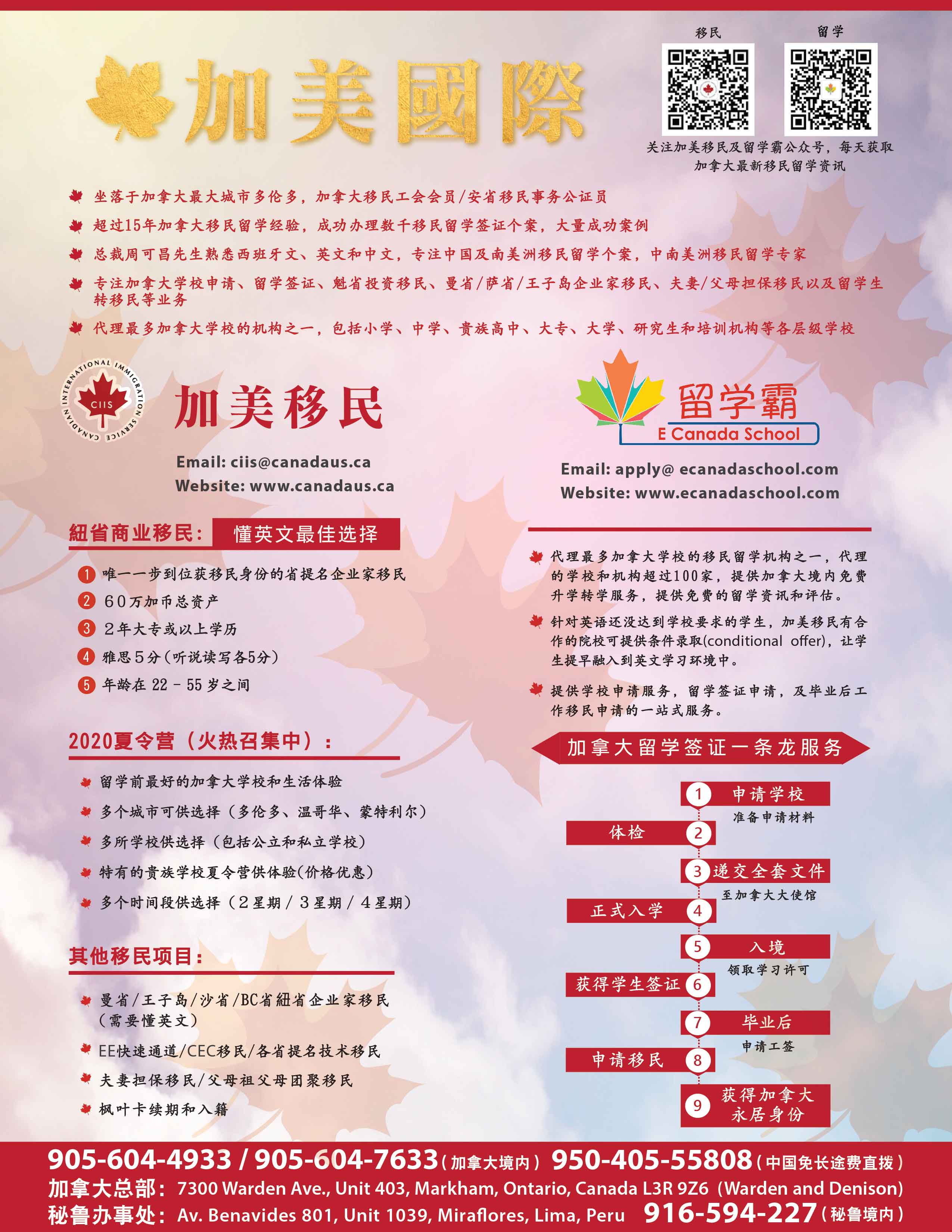Scan


“In these extraordinary times, our government is taking extraordinary measures,” “Right now, my only job is to make sure that Canadians can keep food in the fridge, that they can keep a roof over their heads, that they can afford the medicine that they need,” ”Our government is doing to make sure that no matter where you live, what you do, or who you are — you will get the support you need during this time," “No matter what the future holds, Canadians can count on us.” he said.
(https://pm.gc.ca/en/news/speeches/2020/03/18/prime-ministers-remarks-announcing-covid-19-economic-response-plan)

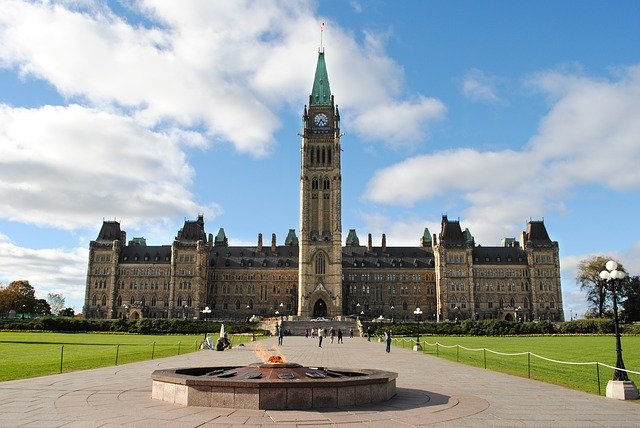
March 30
Wage Subsidy Program announced
Qualified employer
Qualified employers will include individuals, taxable companies and partnerships made up of qualified employers as well as non-profit organizations and registered charities.
Public agencies will not be eligible for this subsidy. Public institutions include municipal and local governments, Crown Corporation, public universities, colleges, schools, and hospitals.
This subsidy will be provided to qualified employers and their income will drop by at least 30. When applying for subsidies, employers will be required to demonstrate a decline in income.
Calculating income
The income earned by the employer for this purpose will be the income from its business in Canada, which is obtained through normal trading channels. Income will be calculated using the employer's usual accounting methods and will be excluded from non-recurring items and capital amounts.
For non-profit organizations and charities, the government will continue to work with the industry to ensure that the definition of income is appropriate to their circumstances.
Amount of subsidy
The amount of subsidy for qualifying remuneration paid to a given employee between March 15 and June 6, 2020, whichever is higher:
Pay 75% of total salary with a maximum weekly payment of $ 847; and
The amount of compensation paid, up to $ 847 per week, or 75% of the employee's weekly salary before the crisis, whichever is lower.
Eligible compensation may include salary, wages and other compensation. These amounts are usually the amount the employer requires the employer to withhold or deduct due to the employee's income tax obligations. However, it does not include severance payments or items such as share options benefits or personal use of company vehicles.
Employers must do their best to maintain employees' wages to bring them to pre-outbreak levels.
Qualifying period
It usually depends on changes in the monthly income (year-on-year) of eligible employers during the calendar month that begins the period. The amount of wage subsidy (according to the COVID-19 Economic Response Plan) that employers receive in a given month will be ignored to measure the yearly change in monthly income.
For example, if income in March 2020 has fallen by 50% compared to March 2019, employers will be allowed to request Canadian emergency wage subsidies for salaries paid between March 15 and April 11, 2020 (above) Calculations). The table below outlines each claim period and the period in which its income has fallen by 30% or more.
How to apply
Eligible employers will be able to apply for Canada's Emergency Wage Allowance through the Canada Revenue Agency's My Business Account. Employers must keep records to prove that they have reduced income and paid compensation. The application process will be announced later.
Official Website: https://www.canada.ca/en/department-finance/news/2020/04/the-canada-emergency-wage-subsidy.html
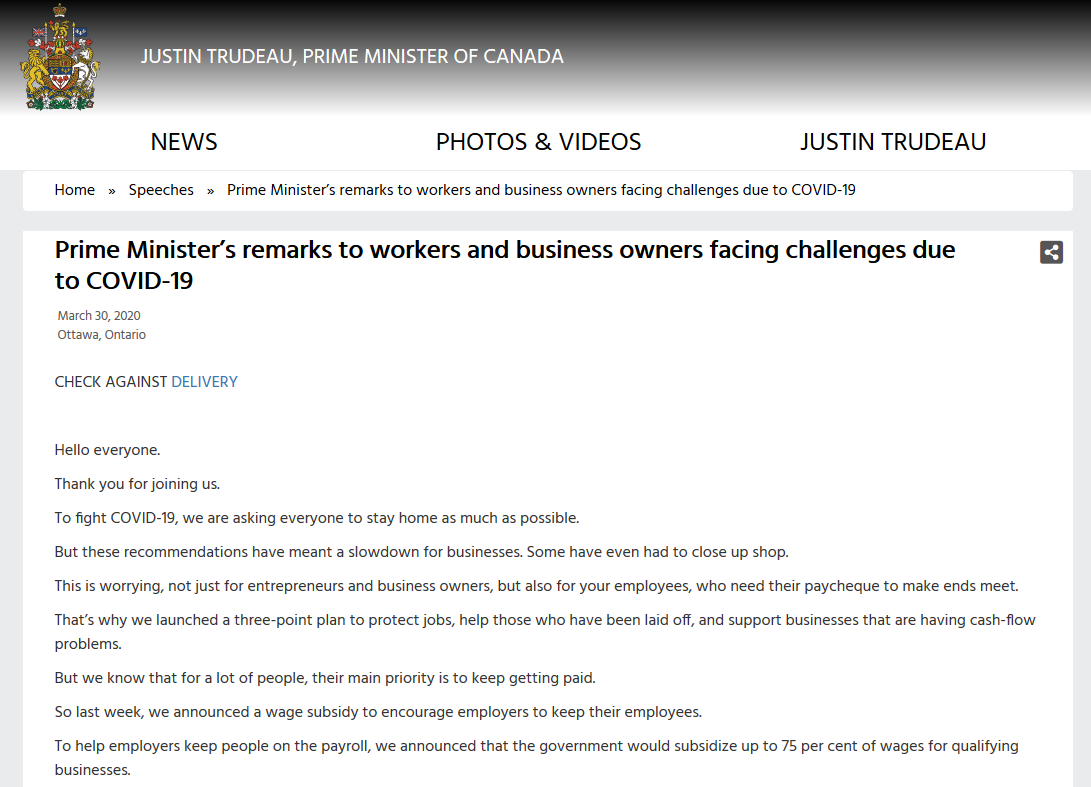
March 30
Government of Canada funds broadcasting
Canadians rely on radio and television to keep up to date on COVID-19. They have been providing news and information programs around the clock, while facing operational challenges and a sharp decline in advertising revenue. In light of this, after discussions with the Canadian government, the Canadian Radio-television and Telecommunications Commission will not issue a letter requesting broadcasters to pay the first part of their licence fees in fiscal 2020-21. This can immediately reduce the financial burden on the broadcasting industry and release more than 30 million yuan in cash.
Official Website: https://www.canada.ca/en/canadian-heritage/news/2020/03/covid-19-the-government-of-canada-provides-relief-to-the-broadcasting-sector.html

March 30
Canadian government funds Airport
In order to help the airport reduce the financial pressure imposed by COVID-19 on costs, the government will waive the national airport's rent from March 2020 to December 2020, involving an amount of about 331.4 million yuan (based on the same period in 2018).
The 21 national airports covered by this measure are non-profit, non-shareholding capital companies that pay rents to operate Canadian airports under long-term leases with Transport Canada. Rent is based on government-owned revenue from operating airports and related land. The 21 airports that will receive rent exemptions are:
• St. John ’s International Airport Authority
• Gander International Airport Authority Inc.
• Halifax International Airport Authority
• Charlottetown Airport Authority Inc.
• Saint John Airport Inc.
• Greater Moncton International Airport Authority Inc.
• Fredericton International Airport Authority
• Aéroport de Québec Inc.
• Aéroports de Montréal
• Ottawa Macdonald-Cartier International Airport Authority
• Greater Toronto Airports Authority
• Greater London International Airports Authority
• Thunder Bay International Airports Inc.
• Winnipeg Airports Authority Inc.
• Regina Airport Authority
• Saskatoon Airport Authority
• Edmonton Regional Airports Authority
• Calgary Airport Authority
• Prince George Airport Authority Inc.
• Vancouver International Airport Authority
• Victoria Airport Authority
Official Website:
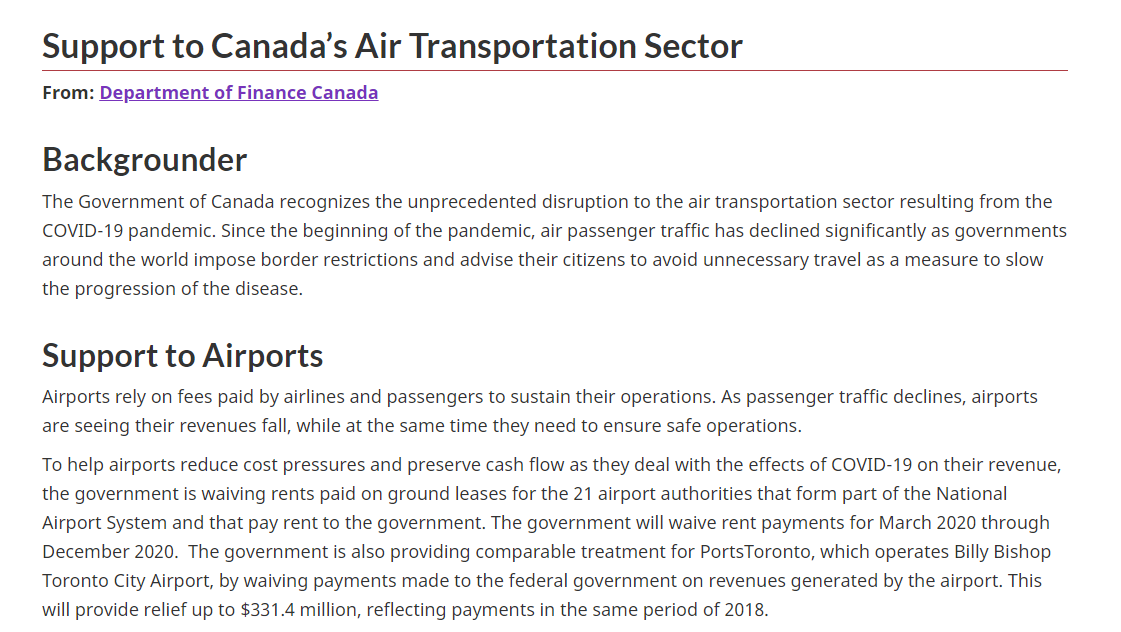
March 29
Announcing additional funding to help the vulnerable
Canadian Prime Minister Trudeau announced on March 29 measures to support vulnerable Canadians to help them cope with the COVID-19 epidemic. These measures will help provide young people with mental health support and services to older Canadians.
Trudeau said the Canadian government would:
• Assistance for counselling services for children and adolescents. Due to school closures, demand for Kids Help Phone counseling services is growing 24 hours a day, 7 days a week, across Canada. In view of this, the government will provide $ 7.5 million in funding to Kids Help Phone to provide young people with mental health counseling. Kids Help Phone is a community service for children and adolescents who provides professional advice, information and referrals to young people across the country in English and French.
• The Canadian government will donate $ 9 million to local organizations through United Way Canada to support practical services to the elderly. These services may include delivery of groceries, medicines or other required items, or personal outreach activities. United Way Canada is a charitable organization dedicated to improving people's lives and building strong communities across Canada. They serve disadvantaged groups such as the elderly, the disabled and homeless Canadians.
• As announced on March 18, the government will provide another $ 157.5 million to meet the needs of homeless people in Canada. The government will also provide up to $ 50 million to women's shelters and sexual assault centers, including facilities in indigenous communities, to help them face or prevent the outbreak.
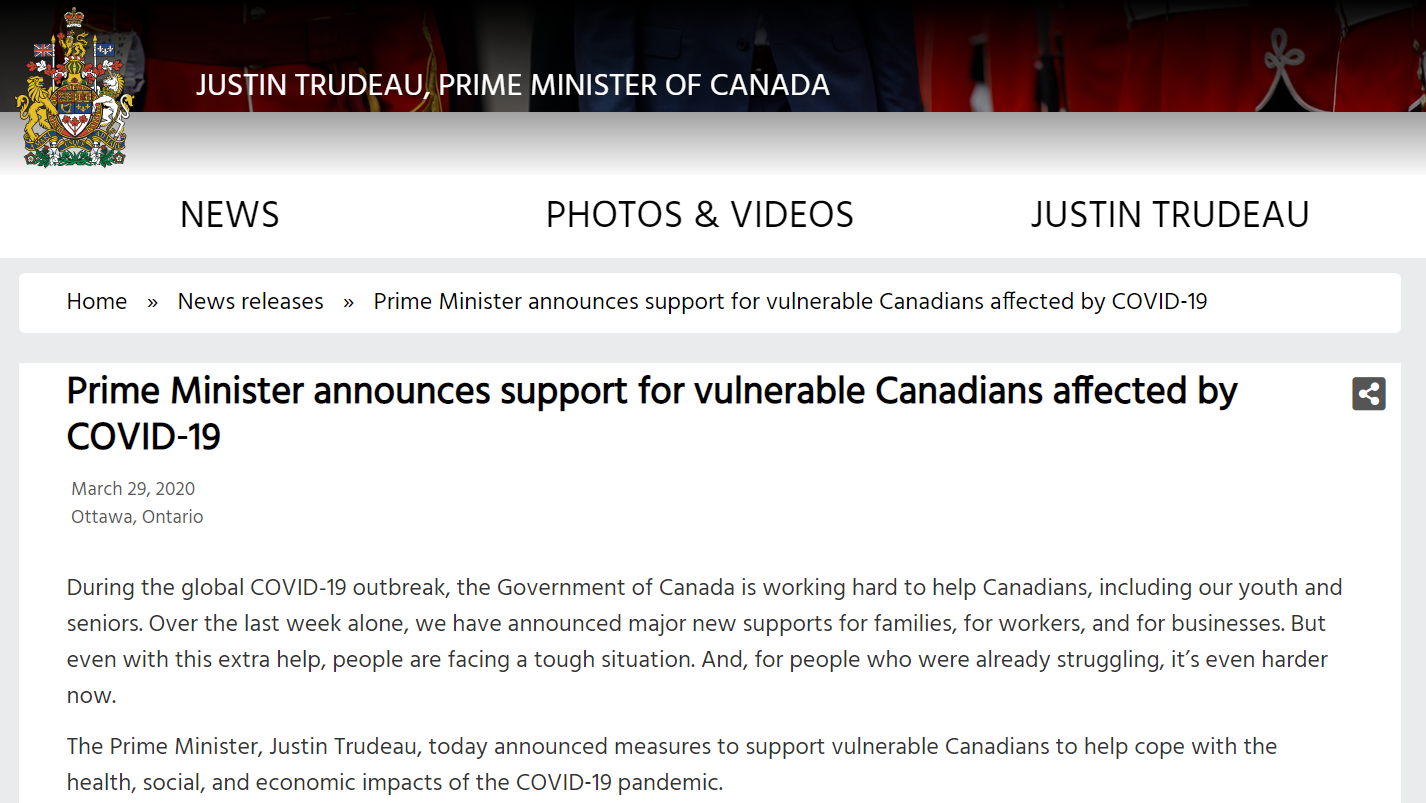
March 27
Announced Canada Emergency Business Account and Small and Medium-sized Enterprise Loan and Guarantee program
Trudeau announced other new measures on March 27 to support small businesses affected by COVID-19. This is part of the government's COVID-19 Economic Response Plan, which has promised to provide Canadians $ 107 billion in support so they can buy food, pay rent and care for loved ones, and at this difficult time for Businesses provide support.
To further support small businesses, the Canadian government will:
• Wage subsidy for eligible companies increased to 75% and goes back to March 15.
• Extend the GST / HST payment period to June. The extension also applies to customs duties, service tax and profits tax on imported products.
• The newly established Canada Emergency Business Account will provide funding to eligible financial institutions so that they can provide interest-free loans of up to $ 40,000 to companies with a credit line of less than $ 1 million. The loan is guaranteed by the federal government, and if the company can meet certain conditions, it can be exempted from 10,000 yuan.
• The new Small and Medium-sized Enterprise Loan and Guarantee program will operate as follows: Export Development Canada will provide guarantees to financial institutions so that they can provide them to SMEs , Issuing new business credits and cash flow term loans of up to 6.25 million yuan. These loans will be guaranteed 80% by the Canadian Export Development Agency.
SMEs can also get help through the new Co-Lending Program. The plan will provide these companies with term loans to meet their operating cash flow needs. Qualified companies can get a credit line of up to 6.25 million yuan through the program. The Canadian Commercial Development Bank and financial institutions will share 80% of the risk.
Official Website:
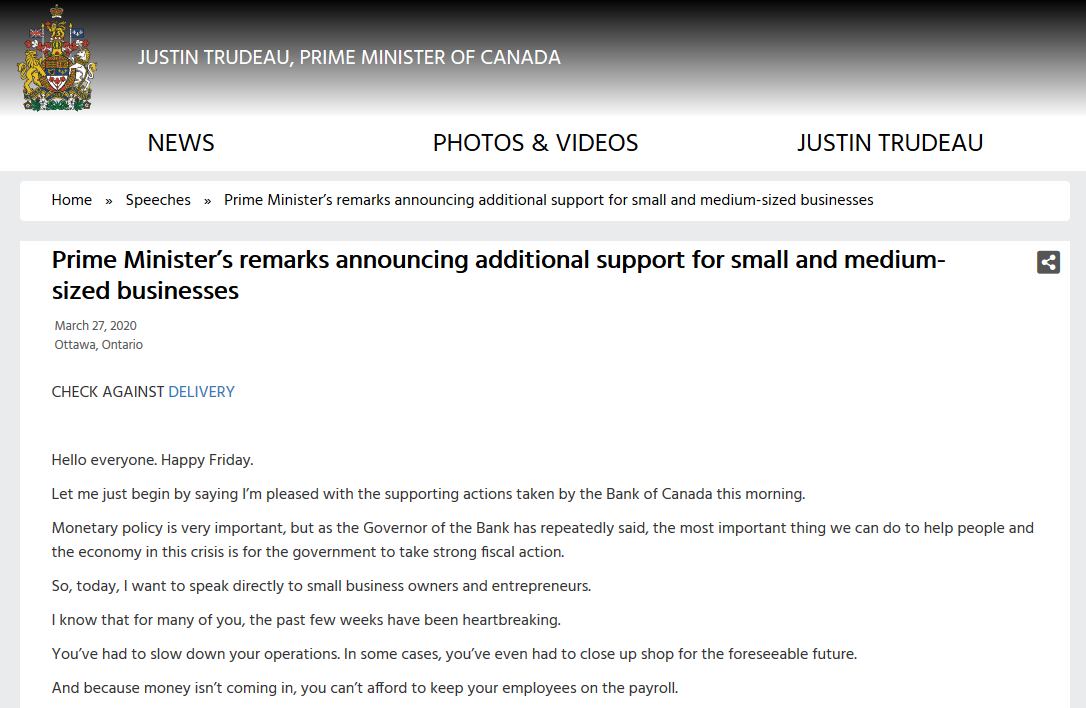
March 25
Announcing Canada Emergency Response Benefit (CERB)
The government introduced the Canadian Emergency Response Benefit to help individuals and businesses.
To support workers and help businesses retain employees, the government has introduced legislation to establish the Canadian Emergency Response Benefit (CERB). This benefit will provide $ 2,000 per month for workers who have lost their income due to COVID-19 for up to four months.
The CERB covers Canadians who have lost their job, become ill, isolate or care for someone with COVID-19, and working parents who must stay home to take care of a sick or child at home without compensation. CERB will apply to those working class who are not eligible for Employment Insurance (EI), as well as contract workers and self-employed persons.
In addition, workers who are still working but have not received income due to work interruptions due to COVID-19 are also eligible for CERB.
• CERB accepts applications from early April. Eligible individuals will begin receiving CERB payments within 10 days of application.
• CERB will pay a fee every four weeks, valid from March 15, 2020 to October 3, 2020.
This four-month, $ 2,000-a-month benefit applies to:
• Workers who have to stop working due to COVID-19 and cannot get paid vacation or other income.
• Workers who are ill, isolate or care for people with COVID-19.
• Working parents who must stay at home to take care of children who are sick or in need of extra care due to interruptions in school and day care services.
• Employees who are still employed but not paid because they do not currently have sufficient work, and their employer has asked them not to go to work.
• Salaried and self-employed persons, including contract employees, who are not eligible for employment insurance.
Official Website:
https://www.canada.ca/en/services/benefits/ei/cerb-application.html
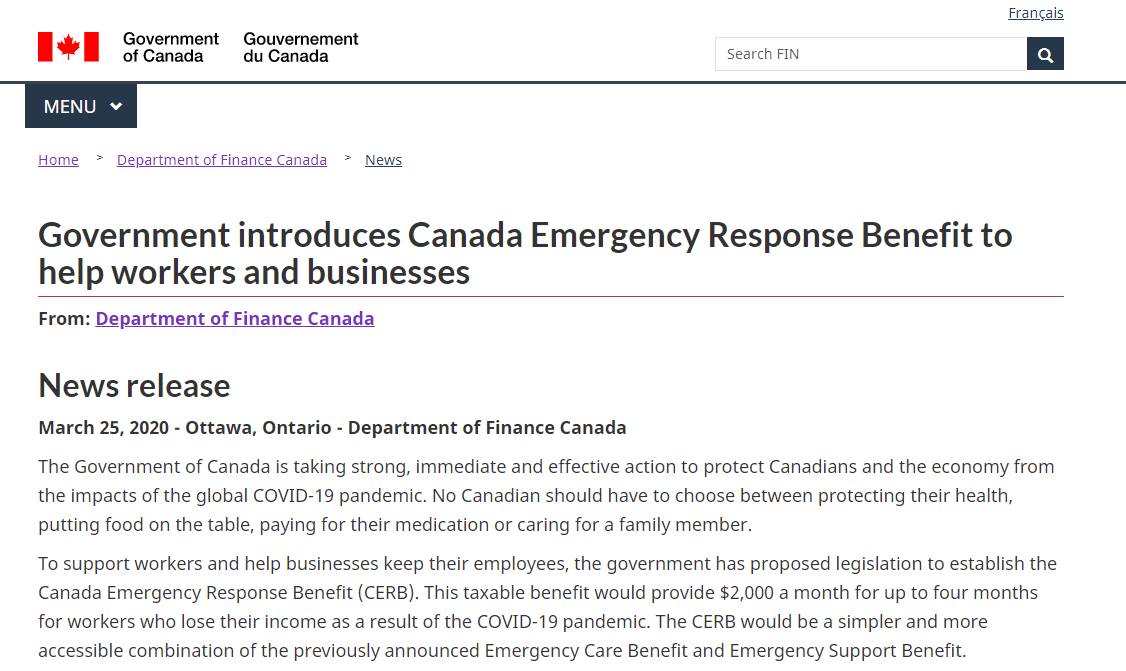
March 20
Announcement of amendments to eligibility standards for mortgage insurance to continue providing loans to businesses and individuals
On March 20, 2020, the Canadian Treasury announced that due to the economic impact of the global COVID-19 outbreak, the Canadian government is taking significant action to support Canadian consumers and businesses facing financial difficulties.
Treasurer Bill Morneau announces amendments to eligibility criteria for mortgage insurance that are based on the National Housing Act and the Protection of Residential Mortgage or Hypothecary Insurance Act. These changes will help provide financial institutions and mortgage lenders with stable funding and liquidity, and support continued lending to Canadian businesses and consumers.
The announcement is in support of a $ 50 billion Canadian Mortgage Purchase Plan (CMPP) launched by the Canadian Mortgage and Housing Corporation (CMHC) on March 16, 2020, and the plan details released by CMHC on March 20, 2020 information. The amendment allows mortgage lenders to include previously uninsured mortgages in the National Housing Law Mortgage Backed Securities (NHA MBS) so that CMHC can purchase these securities through IMPP. The impact of this measure will provide financial institutions with more liquidity. This, in turn, will allow financial institutions to continue to provide loans to businesses and individuals, while helping clients who are facing difficulties and need flexibility, as appropriate.
Official Website: https://www.canada.ca/en/department-finance/news/2020/03/government-of-canada-announces-additional-measures-to-support-continued-lending-to-canadian-consumers- and-businesses.html
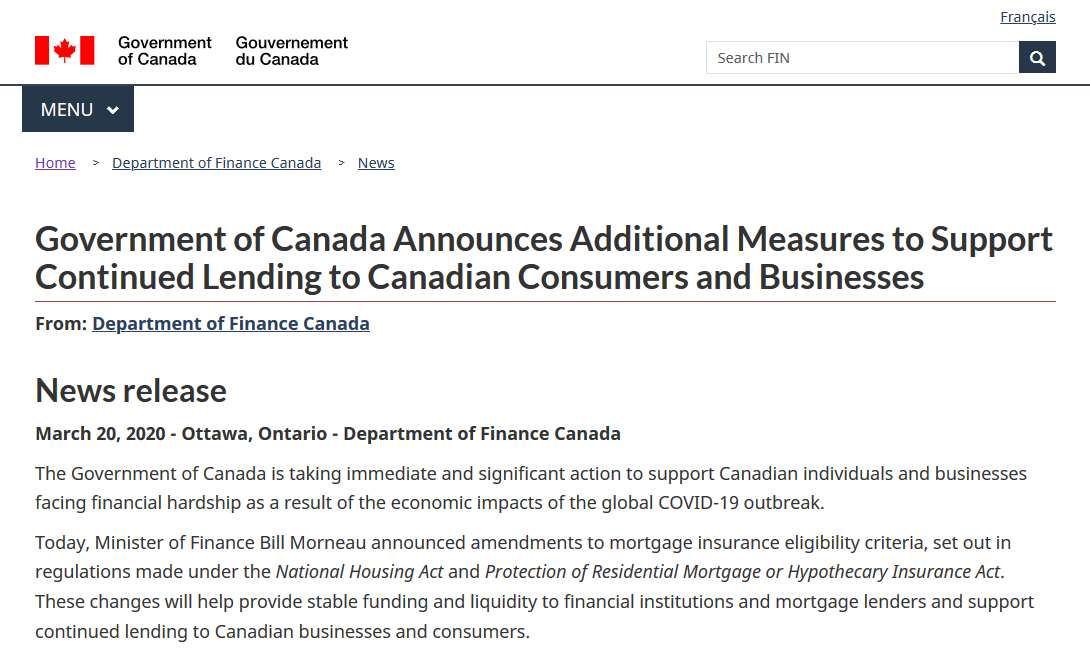
March 18
Announcing the $ 82 billion Economics Response Plan
Support for workers
Canadians should not have to worry about paying their rent or mortgage or buying groceries because of the COVID-19 crisis. To support workers and their families, the Government of Canada is taking action to:
Provide additional assistance to families with children by temporarily boosting Canada Child Benefit payments. This measure would deliver almost $2 billion in extra support.
Introduce an Emergency Care Benefit of up to $900 bi-weekly for up to 15 weeks to provide income support to workers who must stay home and do not have access to paid sick leave. This measure could provide up to $10 billion to Canadians, and includes:
Workers, including the self-employed, who are sick, quarantined, or who have been directed to self-isolate but do not qualify for Employment Insurance (EI) sickness benefits.
Workers, including the self-employed, who are taking care of a family member who is sick with COVID-19, such as an elderly parent or other dependents who are sick, but do not qualify for EI sickness benefits.
EI-eligible and non EI-eligible working parents who must stay home without pay because of children who are sick or who need additional care because of school closures.
Introduce an Emergency Support Benefit delivered through the Canada Revenue Agency to provide up to $5 billion in support to workers who are not eligible for EI and who are facing unemployment.
Provide additional assistance to individuals and families with low and modest incomes with a special top-up payment under the Goods and Services Tax (GST) credit. This measure would inject $5.5 billion in the economy.
Waive, for a minimum of six months, the mandatory one-week waiting period for EI sickness benefits for workers in imposed quarantine or who have been directed to self-isolate, as announced on March 11.
Waive the requirement for a medical certificate to access EI sickness benefits.
Extend the tax filing deadline for individuals to June 1, and allow all taxpayers to defer, until after August 31, 2020, the payment of any income tax amounts that become owing on or after today and before September 2020. This relief would apply to tax balances due, as well as instalments, under Part I of the Income Tax Act. No interest or penalties will accumulate on these amounts during this period. This measure will result in households having more money available during this period.
Provide eligible small businesses a 10 per cent wage subsidy for the next 90 days, up to a maximum of $1,375 per employee and $25,000 per employer. Employers benefiting from this measure would include corporations eligible for the small business deduction, as well as not-for-profit organisations and charities. This will help employers keep people on their payroll and help Canadians keep their jobs.
Provide increased flexibility to lenders to defer mortgage payments on homeowner government-insured mortgage loans to borrowers who may be experiencing financial difficulties related to the outbreak. Insurers will permit lenders to allow payment deferral beginning immediately.
In addition, to provide targeted support for vulnerable groups, the Government is investing to:
Reduce minimum withdrawals from Registered Retirement Income Funds (RRIFs) by 25 per cent for 2020 in recognition of volatile market conditions and their impact on many seniors’ retirement savings.
Implement a six-month, interest-free, moratorium on Canada Student Loan payments for all individuals who are in the process of repaying these loans.
Provide $305 million for a new distinctions-based Indigenous Community Support Fund, to address immediate needs in First Nations, Inuit, and Métis Nation communities.
Support women and children fleeing violence by providing up to $50 million to women’s shelters and sexual assault centres to help with their capacity to manage or prevent an outbreak in their facilities. This includes funding for facilities in Indigenous communities.
Provide an additional $157.5 million to address the needs of Canadians experiencing homelessness through the Reaching Home program.
Support for business
In the face of an uncertain economic situation and tightening credit conditions, the Government is taking action to help affected businesses. To support Canadian businesses and help them retain their workers during this difficult time, the Government is announcing measures to:
Allow all businesses to defer, until after August 31, 2020, the payment of any income tax amounts that become owing on or after today and before September 2020. This relief would apply to tax balances due, as well as instalments, under Part I of the Income Tax Act. No interest or penalties will accumulate on these amounts during this period. This measure will result in businesses having more money available during this period.
Increase the credit available to small, medium, and large Canadian businesses. As announced on March 13, a new Business Credit Availability Program will provide more than $10 billion of additional support to businesses experiencing cash flow challenges through the Business Development Bank of Canada and Export Development Canada. The Government is ready to provide more capital through these financial Crown corporations.
Further expand Export Development Canada’s ability to provide support to domestic businesses.
Provide flexibility on the Canada Account limit, to allow the Government to provide additional support to Canadian businesses, when deemed to be in the national interest, to deal with exceptional circumstances.
Augment credit available to farmers and the agri-food sector through Farm Credit Canada.
Launch an Insured Mortgage Purchase Program to purchase up to $50 billion of insured mortgage pools through the Canada Mortgage and Housing Corporation (CMHC). As announced on March 16, this will provide stable funding to banks and mortgage lenders and support continued lending to Canadian businesses and consumers. CMHC stands ready to further support liquidity and the stability of the financial markets through its mortgage funding programs as necessary. The Government will enable these measures by raising CMHC’s legislative limits to guarantee securities and insure mortgages by $150 billion each.
(Source: Government of Canada)

